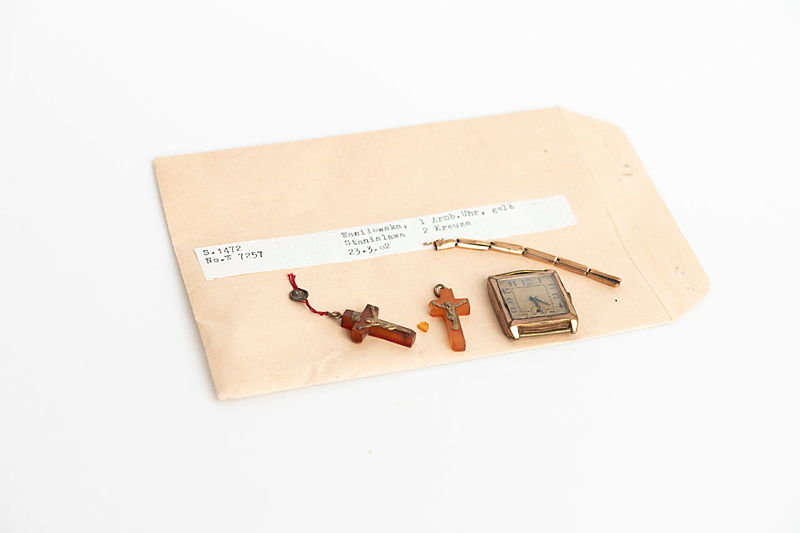An archive in Germany has returned personal items confiscated from Polish prisoners of concentration camps to their families. The objects, which included watches, jewellery, letters and photographs, were handed over at a ceremony in Warsaw this week.
The items had belonged to 12 Poles who were sent to concentration camps during and after the 1944 Warsaw Uprising, which was brutally suppressed by the German occupiers.
The objects were handed over by the Arolsen Archives, an internationally governed institution based in Bad Arolsen, Germany, and focused on documenting Nazi persecution. One of its main tasks is to trace missing persons and provide family members with information.
The archives hold around 2,000 items belonging to former concentration camp inmates from over 30 countries, mainly Poland, Germany, and former Soviet states. Their aim is to return all of the items to the families of the original owners.
This week’s event in Warsaw was part of a campaign, “The Warsaw Uprising: 100 Untold Stories”, marking the 80th anniversary of the uprising, the largest single resistance operation of World War Two.
“The goal of the campaign is to locate the families of 100 victims, return the last mementoes of their loved ones to them, tell 100 unknown stories, and restore the memory of the victims,” wrote the Arolsen Archives.
Sorry to interrupt your reading. The article continues below.

Notes from Poland is run by a small editorial team and published by an independent, non-profit foundation that is funded through donations from our readers. We cannot do what we do without your support.
Among the victims whose items were returned at the ceremony on Tuesday were two sisters, Zofia Strusińska and Józefa Skórko. They were both arrested during the uprising and deported to concentration camps.
According to the Arolsen Archives, Strusińska, who was 47 when the uprising broke out, was first sent on 4 September 1944 to the Ravensbrück women’s concentration camp in Germany.
A few weeks later, she was transported to Bartensleben subcamp, where she had to perform forced labour. She was rescued from the camp by the Swedish Red Cross and later transported to Sweden.
According to the Associated Press (AP), Skórka also ended up in Sweden, where – the family story goes – a Swedish man fell in love with one of the sisters and urged both of them to stay. They decided, however, to go back to Poland.
The descendants of two Polish businessmen persecuted during the German-Nazi occupation of Poland are suing German firms Bayer and Henschel for €4.3m in compensation.
The lawyers behind the cases hope they can open a pathway to further similar claims https://t.co/yY1QqVSRff
— Notes from Poland 🇵🇱 (@notesfrompoland) June 21, 2023
A golden chain belonging to Strusińska and a tooth filling belonging to Skórka were handed over to Adam Wierzbicki, a great-grandson of Stanislaw Wierzbicki, the brother to the pair, reports AP.
Items were also collected by the family of Stanisława Wasilewska, captured on 31 August 1944. Like Strusińska, Wasilewska was sent to Ravensbrück and later transported to the Neuengamme forced labour camp.
Her jewellery – including two amber crucifixes, part of a golden bracelet and a gold wristwatch engraved with the initials KW and the date 7-3-1938, probably the date of her wedding – were returned to her grandson and great-granddaughter. They are pictured above.
In July this year, Germany announced that it intends to provide support to surviving victims of German-Nazi crimes. Earlier this month, the German ambassador to Poland said that talks were ongoing with Poland on the issue.
During a visit to Warsaw in July, Chancellor Olaf Scholz announced that his country would "try to provide support to [Polish] survivors of the [German] occupation" https://t.co/gKX6142Alo
— Notes from Poland 🇵🇱 (@notesfrompoland) September 4, 2024
Main image credit: Arolsen Archives

Alicja Ptak is deputy editor-in-chief of Notes from Poland and a multimedia journalist. She has written for Clean Energy Wire and The Times, and she hosts her own podcast, The Warsaw Wire, on Poland’s economy and energy sector. She previously worked for Reuters.



















